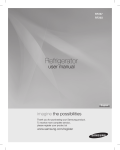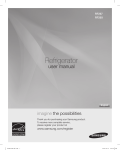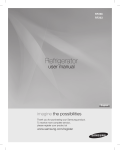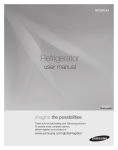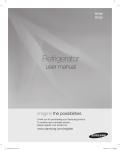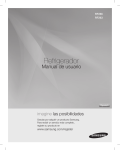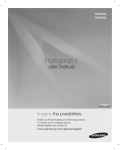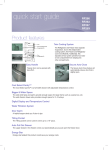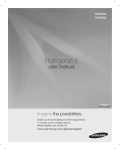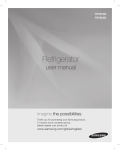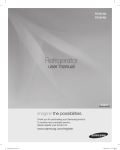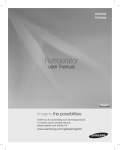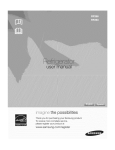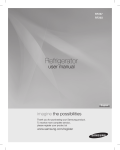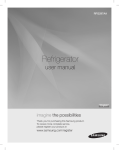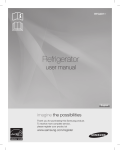Download Samsung RF265 User manual
Transcript
RF197ACWPXAC RF197ACWPXAC RF197ACBPXAC RF197ACRSXAC RF263AFRSXAC Features of your new Refrigerator Key features of your new refrigerator Your Samsung French Door Refrigerator comes equipped with various innovative storage and energy-efficient features. • Twin Cooling System The Refrigerator and Freezer have separate evaporators. Due to this independent cooling system, the Freezer and Refrigerator cool more efficiently. Additionally, this separate air flow system prevents food odor of one compartment from seeping into other compartments. • Cool Select PantryTM The Cool Select PantryTM is a full-width drawer with adjustable temperature control. • Bigger & Wider Space The wide shelf area and pantry provide enough space for larger items such as a pizza box, etc. The wide freezer drawer also provides enough space for 2~3 turkeys. • Secure Auto Close The Secure Auto Close feature will automatically close a door that is slightly open. • Digital Display and Temperature Control • Water Filtration System • Door Alarm A helpful beeper alerts you if the door is ajar. • Tilting Pocket The Tilting pocket can be used to store up to a 16” pizza. • Auto Pull Out Drawer The upper drawer in the freezer comes out automatically as you just open the freezer door. • Easy Handle Freezer door can be opened with less effort. • Energy Star Energy star labeled this product could save your energy costs. For easy future reference, write the model and serial number down. You will find your model number and serial number on the left side of the refrigerator. 2_ Features Model # Serial # Safety Information SAFETY INFORMATION Before using your new Samsung French Door Refrigerator, please read this manual thoroughly to ensure that you know how to safely and efficiently operate the features and functions that your new appliance offers. Because the following instruction covers various models, the characteristics of your Refrigerator may differ slightly from the Refrigerator described in this manual. If you have any question, contact us at 1-800-SAMSUNG or find help and information online at www.samsung.com. What the icons and signs in this user manual mean : WARNING Hazards or unsafe practices that may result in severe personal injury or death. CAUTION Hazards or unsafe practices that may result in minor personal injury or property damage. CAUTION To reduce the risk of fire, explosion, electric shock, or personal injury when using your refrigerator, follow these basic safety precautions: Do NOT attempt. Do NOT disassemble. Do NOT touch. Follow directions explicitly. Unplug the power plug from the wall socket. Make sure the machine is grounded to prevent electric shock. Call the service center for help. These warning signs are here to prevent injury to you and others. Please follow them explicitly Keep this manual in a safe place for future reference. SEVERE WARNING SIGNS Do not plug several appliances into the same power receptacle. • Large appliances draw a lot of power. Powering more than one appliance or machine from a single power source could cause overheating and cause a fire. Make sure that the power plug is not kinked or damaged by the back of the Refrigerator. • A damaged power plug may overheat and cause a fire. Do not spray water directly into or on the outside of the Refrigerator/Freezer drawer. • Water could get into the interior machine parts and cause electric shock. Do not use aerosols near the Refrigerator. • Aerosols used near the Refrigerator may cause an explosion or fire. Safety Information _3 Safety Information Do not put undue stress on the power cord or place heavy articles on it. • Placing heavy articles on the power cord create the risk of explosion or fire. Do not insert the power plug with wet hands. • It may cause electric shock. Do not put a container filled with water on the Refrigerator. • If it spills, it may cause fire or electric shock. Do not install the Refrigerator in a damp place or place where it may come in contact with water. • Wet and/or deteriorated insulation of the internal electrical parts may cause electric shock or fire. Do not store volatile, flammable or high evaporating substances in the refrigerator. • Storing benzene, thinner, alcohol, ether, LP gas, dryice, and other such products may cause explosions. Do not disassemble or repair the Refrigerator by yourself. • You run the risk of fire, appliance malfunctions and/or personal injury. Call your nearest service center for help from a qualified service technician. Unplug the Refrigerator before changing the interior light. • Changing the light while the Refrigerator is plugged in may cause electric shock. If you wish to dispose of the Refrigerator, remove the doors and seals before throwing it away. • T he doors(and their seals) can entrap a child if they climb into the Refrigerator. Make sure that the doors are off, and ensure that no one is suffocated by being locked inside. The Refrigerator must be safely grounded • Always make sure that you have grounded the Refrigerator before attempting to investigate or repair any part of the appliance. Power leakages can cause severe electric shock. Never use gas pipes, telephone lines or other potential lightning attractors as an electrical ground. • Improper use of the grounding plug can result in a risk of electric shock. If it is necessary to use an extension cord to power the Refrigerator, use only a 3-wire extension cord that has a 3-blade ground plug and a 3-slot receptacle that will accept the plug on the appliance. The marked rating of the extention cord should be AC 115V~120V, 10A, or more. Additionally, if a grounding adapter is used, make sure the receptacle box is also fully grounded. 4_ Safety Information CAUTION SIGNS Use good judgment when filling the Refrigerator with food and drinks. • In an overfull Refrigerator, heavy, fragile, bulky or breakable items may fall out and cause personal injury and/or damage to surrounding objects. Do not put bottles or glass containers in the Freezer drawer. • When the contents freeze and then expand, the glass may break and cause personal injury or leave dangerous glass shards in the Freezer. If the electrical wall socket is loose, do not insert the power plug. • There is a risk of electric shock or fire. Have the plug looked at by a licensed electrician. Never unplug your Refrigerator by pulling on the power cord. • Always grip the power cord firmly and pull straight out from the outlet. Yanking or pulling on the power cord may cause a short-circuit, fire and/or electric shock. • A damaged power cord must be replaced by the manufacturer, a certified service agent or qualified service personnel. Do not store articles on the top of the appliance. • When you open or close the door, the articles may fall and cause personal injury and /or damage to surrounding objects. Do not store pharmaceutical products, scientific materials and temperature-sensitive products in the refrigerator. • Products that require exact temperature controls should not be stored in the Refrigerator. CAUTION Do not allow children to climb, stand or hang on shelves and handles of the Refrigerator. They could damage the Refrigerator and seriously injure themselves. If you notice chemical or burning plastic smells or see smoke, unplug the Refrigerator immediately and contact your Samsung Electronics Service Center. After your Refrigerator is in operation, do not touch the cold surfaces in the Freezer compartment. Particularly when hands are damp or wet, skin may adhere to these extremely cold surfaces. • Skin may stick to the surface and you may get frostbite. Do not put your hands under the appliance. • Any sharp edges may cause personal injury. Never put fingers or other objects into the water dispenser hole or ice chute. • It may cause personal injury and/or material damage. Safety Information _5 Safety Information If the Refrigerator will not be used for a long period of time (for example, over several months), unplug the power from the wall. • Over time, deterioration in the power cord insulation may cause fire. Do not use a wet or damp cloth when cleaning the plug. Remove any dust or foreign matter from the power plug pins. • A Dirty power plug can increase the risk of fire. If the Refrigerator is disconnected from the power supply, you should wait for at least five minutes before plugging it back in. Do not place the equipment directly in sunlight. The appliance must be positioned so that the power cord is accessible after installation. If the power cord is damaged, it must be replaced by the manufacturer, a certified service agent or qualified service personnel. If you have a long vacation planned, empty the Refrigerator and turn it off. Wipe excess moisture from the inside and leave the doors open to keep odor and mold from developing. Service Warranty and Modification • Any changes or modifications performed by a 3rd party on this finished appliance is not covered under Samsung warranty service, nor can Samsung be responsible for safety issues that result from 3rd party modifications. CAUTION Children can get trapped inside Refrigerators. Before you throw away your old Refrigerator or Freezer, make sure that you; • Take off the doors. • Leave all shelves in places so that children may not easily climb inside and shut the door while they are inside. This appliance is not intended for use by small children or infirm persons without capable, adult supervision. Small children should be supervised when using the appliance. Do not block air holes • If the air holes are blocked, especially with plastic bag, refrigerator can be over cooled. If this cooling period lasts long, water filter will be broken and cause water leakage. 6_ Safety Information Contents SETTING UP YOUR FRENCH DOOR REFRIGERATOR 08 OPERATING your SAMSUNG FRENCH DOOR REFRIGERATOR 19 TROUBLESHOOTING 08 09 09 11 13 14 15 16 17 Getting ready to install the refrigerator Setting up the refrigerator Removing the refrigerator doors Reattaching the refrigerator doors Adjusting the doors Making minor adjustments between doors Adjusting the freezer drawer Checking the water dispenser line Installing the water line 19 20 21 21 22 23 24 25 26 27 28 29 30 Using the control panel Using the digital display Controlling the temperature Using the cold water dispenser Parts and Features Storing food Using the Cool Select Pantry™ Removing the refrigerator accessories Using the doors Removing the freezer drawer accessories Cleaning the refrigerator Changing the interior lights Changing the water filter 35 Troubleshooting 35 WARRANTY 36 Warranty 36 wiring diagram 38 Wiring diagram 38 Contents _7 Setting up your French Door Refrigerator GETTING READY TO INSTALL THE REFRIGERATOR Congratulations on your purchase of the Samsung French Door Refrigerator. We hope you enjoy the state-of-art features and efficiencies that this new appliance offers. Selecting the best location for the Refrigerator 2 inch • A location with easy access to the water supply. • A location without direct exposure to sunlight. • A location with level (or nearly level) flooring. • A location with enough space for the Refrigerator doors to open easily. 2 inch •A llow sufficient space for air circulation of the internal cooling system. If the Refrigerator does not have enough space, the internal cooling system may not work properly. If your refrigerator has an ice maker, allow extra space at the back for the water line connections. When you install the refrigerator next to a fixed wall, minimum clearance is 3 ¾” (95mm) between the refrigerator and wall to allow the door to swing open. First thing! Make sure that you can easily move your Refrigerator to its final location by measuring doorways (both width and height), thresholds, ceilings, stairways, etc. The following chart details the exact height and depth of Samsung French Door Refrigerator. B A Model RF266 RF263 Depth “A” Width “B” Height “C” Overall Height “D” Depth “E” 29-⅛” (83.6cm) 35-¾” (90.8cm) 68-⅝” (174.4cm) 69-¾” (177.4cm) 35-⅝” (90.5cm) C E D •A llow clearance to the right, left, back and top when installing. This will help reduce power consumption and keep your energy bills lower. •D o not install the Refrigerator where the temperature will go below 50 ºF (10 ºC). • Condensation may occur on the french door areas when you use Refrigerator for the first time. The E.Saver function is automatically set to on when power is supplied to the Refrigerator. If you experience excess condensation, press the E.Saver button again to turn the feature off. When moving your refrigerator To prevent floor damage be sure the front levelling legs are in the up position (above the floor). Refer to ‘Levelling the refrigerator’ in the manual. To protect the finish of the flooring, place the protection sheet such as packing carton under the refrigerator. CAUTION When installing, servicing or cleaning behind the refrigerator, be sure to pull the unit straight out and push back in straight after finishing. 8_ Setting Up Control Lever Screwdriver SETTING UP THE REFRIGERATOR Check the accessory list below. Removing the refrigerator doors Tools you will need If your entrance won’t allow the Refrigerator to pass easily through it, you can remove the doors. Philips screwdriver 10mm Socket Wrench Flat-blade screwdriver Allen wrench(3/16”) Pliers Disassemble the Refrigerator doors 1. With the door closed, remove the top table( 1 ) using a Philips screwdriver, and then disconnect the wires( 2 ). Remove hinge screws( 3 ) and ground screw( 4 ) 1 3 4 2 2. Lift the door straight up to remove. 3. W ith a Philips head screwdriver, remove the two screws( 10 ) attached to the lower left and right door hinges. With an Allen Wrench(3/16”), remove the two hex head bolts( 11 ) attached to the lower left and right door hinges. Remove the lower left and right door hinges( 12 ). 12 10 11 Setting Up _9 01 SETTING UP Now that you have your new Refrigerator installed and in place, you are ready to set up and enjoy the features and functions of the appliance. By completing the following steps, your Refrigerator should be fully operational. 1. P lace the Refrigerator in an appropriate location with reasonable clearance between the wall and the Refrigerator. Refer to installation instructions in this manual. 2. O nce the Refrigerator is plugged in, make sure the interior light comes on when you open the doors. Hex wrench Compression Compression 3. S et the Temperature control to the coldest (DA80-00002C) nut fitting temperature and wait for an hour. The Freezer will (DA62-00305A) (DA74-00070B) get slightly chilled and the motor will run smoothly. 4. A fter powering the Refrigerator, it will take a few Water filter (DA29-00003B) hours to reach the appropriate temperature. You Fastener Washer can store food and drinks in the Refrigerator once (DA60-00143B) (DA80-00002C) the temperature is sufficiently cool. Setting up your French Door Refrigerator Disassemble the Freezer drawer 1. Push the upper drawer until it reaches to the cabinet rear wall. 2. R emove the tilting pocket( 1 ) by pulling on both brackets( 2 ) upward at the same time. SlotSlot 1 2 3. T ake out the lower basket( 3 ) by lifting the basket up from rail system. 3 4. R emove four 10mm hex-head bolts from both sides. 5. L ift the freezer door up from the rails. 10_ Setting Up REATTACHING THE REFRIGERATOR DOORS Assemble the Refrigerator doors 1. Reattach two flat head screws( 1 ) and two hex head screws( 2 ) to the hinge completely. 12 10 11 01 SETTING UP 2. P lace the hole in the bottom of the door( 3 )over the lower hinge ( 4 ) Be aware not to miss the hinge cap because it can be easily taken off. 3. Insert the upper hinge shaft( 5 ) into the hole on the corner of the Refrigerator door( 6 ). Make sure the hinge is level between the upper hinge hole( 7 ) and the hole of the cabinet( 8 ) and reattach the hinge screws( 9 ) and ground screw( 10 ) by turning in a clockwise direction. Reconnect the wires. 12 9 10 7 5 8 6 4. P lace the front edge of the top table( 11 ) on the front of the upper hinge( 12 ) and reattach with three screws. 11 When reattaching the top table, make sure that the wires are not pressed or damaged by the top table. 12 Setting Up _11 Setting up your French Door Refrigerator assemble the freezer drawer 1. Pull out the rails to the full length on each side of the cabinet evenly. SlotSlot 2. H ang the freezer door front onto open slots on the sides. SlotSlot SlotSlot 3. T ighten four 10mm hex-head screws completely. 4. W ith the drawer pulled out fully, insert the lower basket ( 6 ) into the rail system. 6 5. H ook the ends of the tilting pocket ( 7 ) into both brackets ( 8 ), and push down until they lock into place. 7 8 12_ Setting Up ADJUSTING THE doors Now that the doors are back on the Refrigerator, you want to make sure the Refrigerator is level so you can make final adjustments. If the Refrigerator is not level, it will not be possible to get the doors perfectly even. When the Left door is lower than the Right door. Insert a flat-blade screwdriver into a notch on the left control lever, turn it clockwise or counter-clockwise to level the left door. 01 SETTING UP Control Lever Screwdriver When the Left door is higher than the Right door. Insert a flat-blade screwdriver into a notch on the right control lever, turn it clockwise or counter-clockwise to level the right door. Control Lever Screwdriver We do not recommend making small adjustments with the control lever. Instead, refer to the next page for the best way to make minor adjustments to the doors. Setting Up _13 Setting up your French Door Refrigerator MAKING MINOR ADJUSTMENTS BETWEEN DOORS Remember a level Refrigerator is necessary for getting the doors perfectly even. If you need help, review the previous section on leveling the Refrigerator. When the left door is lower than the right door. When the left door is higher than the right door. Adjustment part Adjustment part 1. If you open the drawer ( 1 ), you can see the lower hinge ( 2 ). 2. Insert the supplied Allen Wrench(3/16”) ( 3 ) into the shaft ( 4 ) of the lower hinge. ) or 3. Please adjust the height by turning the Allen Wrench(5mm) ( 3 ) clockwise( counter-clockwise( ). 2 3 3 4 1 when you turn the Allen Wrench(5mm) counter-clockwise( ), the door will move up. 1. A fter adjusting the doors, please insert the supplied fastener-ring ( 5 ) using a pair of pliers ( 6 ) in the gap between the hinge-grommet ( 7 ) and the lower hinge( 8 ). The number of fastener-rings you’ll need to insert depends on the gap. Two fastener-rings are enclosed with the refrigerator. Thickness of each fastener-ring is 0.04 inch. 14_ Setting Up ADJUSTING THE FREEZER DRAWER LEVEL Adjustment part 01 SETTING UP Freezer Drawer 1. Locate the height-adjuster ( 1 ) in the freezer drawer. Unscrew the four Phillips screws ( 2 ) slightly to loosen the door. 1 2 2. L oosen the controller screw( 3 ) with a Phillips screwdriver. 3 3. Find the best level to align the door slope. Example) The slope is about 2mm (0.08inch) as shown below. Slope Reference plane - Rotate the Height Adjuster to +2.0 to reduce the door slope. After adjustment, first tighten screw ( 3 ) and then screw ( 2 ). Setting Up _15 Setting up your French Door Refrigerator CHECKING THE WATER DISPENSER LINE A water dispenser is just one of the helpful features on your new Samsung Refrigerator. To help promote better health, the Samsung water filter removes unwanted particles from your water. However, it does not sterilize or destroy microorganisms. You may need to purchase a water purifying system to do that. In order for the ice maker to operate properly, a water pressure of 20~125 psi (pound per square inch) is required. Under normal conditions, a 170 cc (5.75 oz.) paper cup can be filled in 10 seconds. If the Refrigerator is installed in an area with low water pressure (below 20psi), you can install a booster pump to compensate for the low pressure. Make sure the water storage tank inside the Refrigerator is properly filled. To do this, press the water dispenser lever until the water runs from the water outlet. Water line installation kits are available at extra cost from your dealer. We recommend using a water supply kit that contains copper tubing. Connecting to the water supply line 1. First, shut off the main water supply line and turn the ice-maker off. 2. Locate the nearest cold, drinking water line. 3. A fter connecting the water supply to the water filter, turn your main water supply back on and flush four or more gallons into a bucket to clear and prime the water filter. 1 Cold water line 2 Pipe clamp 3 Water line installation kit 4 Shut off valve 16_ Setting Up INSTALLING THE WATER LINE Connecting the water line to the Refrigerator. There are several items that you need to purchase to complete this connection. You may find these items sold as a kit at your local hardware store. 1/4” compression nut plastic tubing copper tubing ferrule Refrigerator 01 SETTING UP Compression nut (1/4”) (Supplied) Ⓐ Plastic tubing Ⓐ (Supplied) Compression fitting (Supplied) Bulb Ferrule (Not supplied) Compression nut Ⓑ (1/4”) (Not supplied) Copper tubing or Plastic tubing Ⓑ (Not supplied) (Not supplied) Household water line 1. Slip the compression nut Ⓐ through the supplied plastic tubing Ⓐ. 2. T ighten the compression nut Ⓐ onto the 1/4” compression fitting. - If you are using copper tubing, slip the compression nut Ⓑ (not included) and ferrule (not included) on copper tubing (not included) as shown. - If you are using plastic tubing Ⓑ, insert the molded end(Bulb) of the plastic tubing Ⓑ into the compression fitting. Do not use without the molded end(Bulb) of the plastic tubing Ⓑ. CAUTION 3. Tighten the compression nut Ⓑ onto the compression fitting. Do not over-tighten the compression nut Ⓑ. 4. Turn water on and check for any leakage. Only connect the water line to a drinkable water source. If you have to repair or disassemble the water line, cut off 1/4“ of the plastic tubing to make sure you get a snug, leak-free connection. Installing the water filter. 1. Remove the water filter cover( 1 ) 2. R emove the fixed cap by turning it counter clockwise. Keep the cap in a safe place for later use if you don’t use the filter. 3. R emove the water filter from the box and put a replacement indicator sticker on the filter as shown. Place a sticker on the filter that dates six months in the future. For example, if you install the water filter in March, put the “SEP” sticker on the filter to remind you to replace in September. That way you’ll know when it is time to replace the filter. Normally, a filter life is about 6 months. 1 2 3 Sticker (month indicator) Setting Up _17 Setting up your French Door Refrigerator 4. R emove the filter cap and insert the filter into the filter housing. Cover filter. 4 5. S lowly turn the water filter 90º clockwise to align with the printing mark on the cover, locking the filter in position. Make sure to align the water filter label mark with center of cover filter printing as illustrated. Remember, do not overtighten. 5 Turn until the label aligned. Separation of red cap. You should remove the right side upper glass shelf before installing water filters. Removing any residual matter inside the water supply line after installing the water filter. 1. T urn ON the main water supply & turn OFF the valve to the water supply line. 2. R un water through the dispenser until the water runs clear (approx. 6-7 minutes). This will clean the water supply system and remove air from the lines. 3. A dditional flushing may be required in some households. 4. O pen the Refrigerator door and make sure there are no water leaks coming from the water filter. One Touch Pure Water Be sure to flush the dispenser thoroughly or water may drip from the dispenser. This is due to the fact that there is still air in the line. Test button CAUTION In case ice doesn’t come out, pull out the ice bucket and press test button located on the right side of ice maker. Test button Reverse Osmosis Water Supply IMPORTANT : The pressure of the water supply coming out of a reverse osmosis system going to the water inlet valve of the refrigerator needs to be between 35 and 120 psi (241 and 827 kPa). If a reverse osmosis water filtration system is connected to your cold water supply, the water pressure to the reverse osmosis system needs to be a minimum of 40 to 60 psi (276 to 414 kPa.) If the water pressure to the reverse osmosis system is less than 40 to 60 psi (276 to 414 kPa): • C heck to see whether the sediment filter in the reverse osmosis system is blocked. Replace the filter if necessary. • Allow the storage tank on the reverse osmosis system to refill after heavy usage. • If your refrigerator has a water filter, it may further reduce the water pressure when used in conjunction with a reverse osmosis system. Remove the water filter. If you have questions about your water pressure, call a licensed, qualified plumber. 18_ Setting Up Operating your SAMSUNG French Door Refrigerator Using the control panel 02 OPERATING 1 ( 1 ) Ice Off Button ( 2 ) Power Freeze Button 2 3 4 5 6 Press the Ice off button if you want to turn the ice-maker off. Speeds up the time needed to freeze products in the Freezer. It can be helpful if you need to quickly freeze easily spoiled items or if the temperature in the Freezer has warmed dramatically (for example, if the door was left open). ( 3 ) Freezer Button Press the Freezer button to set the Freezer to your desired temperature. You can set the temperature between 8°F and -14°F. ( 4 ) Fridge Button Press the Fridge button to set the fridge to your desired temperature. You can set temperature between 34°F and 46°F. ( 5 ) Power Cool Button Speeds up the time needed to cool products in the Refrigerator. It can be helpful if you need to quickly cool easily spoiled items or if the temperature in the fridge has warmed dramatically (For example, if the door was left open). ( 6 ) E. Saver Button For better energy efficiency, press E.Saver button. However, if condensation occurs on the door, turn the E.Sasver function off. Operating _19 Operating your SAMSUNG French Door Refrigerator USING THE DIGITAL DISPLAY “Freezer Temp” indicates the current Freezer temperature. “Fridge Temp” indicates the current Refrigerator temperature. Power Freeze This icon will light up when you activate the “Power Freeze” feature. “Power Freeze” is great when you need a lot of ice. When you have enough ice, just press the button again to cancel the “Power Freeze” mode. If you select “Power Freeze”, the inside temperature of the Freezer will decrease for about two and a half hours. Ice maker off If you don’t need ice, press the “Ice off” button to save on water and energy consumption. Power Cool This icon will light up when you activate the “Power Cool” button. For a quick fridge cool down, use “Power Cool”. If you select “Power Cool”, the inside temperature of the Fridge will decrease for about two and a half hours. Filter Indicator When the filter indicator light is on, it is time to change the filter. Typically this happens about every 6 months. The filter Indicator will be Blue when you initially insert the water filter. The filter Indicator will be Light Pink when you have used your water filter for 5 months. The filter Indicator will be Red when you have used your water filter for 6 months. After removing the old water filter and installing a new one (see page 30 for instructions on how to do this), reset the indicator by pressing the “Fridge” and “Power Cool” button simultaneously for about 3 seconds. Cooling Off Mode (“OF & OF” code on the display) CAUTION 20_ Operating This function is for store display refrigerators. It is not for customer use. In Cooling Off Mode, the refrigerator works but doesn’t make cool air. To cancel this mode, press the Power Freeze and Freezer buttons at the same time for 3 seconds until a “Ding-dong” sound is heard and the unit will now cool. CONTROLLING THE TEMPERATURE Controlling the Freezer temperature Controlling the Refrigerator temperature The Refrigerator temperature can be set between 46°F and 34°F to suit your particular needs. Press the Fridge button repeatedly until the desired temperature is shown in the temperature display. The temperature control process for the Fridge works just like the Freezer process. Press the Fridge button to set your desired temperature. After a few seconds, the Fridge will begin adjusting towards the newly set temperature. This will be reflected in the digital display. The temperature of the Freezer or the Refrigerator may rise from opening the doors too frequently, or if a large amount of warm or hot food is placed in either side. This may cause the digital display to blink. Once the Freezer and Refrigerator temperature return to their normal set temperatures, the blinking will stop. If the blinking continues, you may need to “reset” the Refrigerator. Try unplugging the appliance, wait for around 10 minutes and then plug the power cord back in. USING THE COLD WATER DISPENSER Using the Water dispenser (RF266) Place a glass underneath the water outlet and push gently against the water dispenser lever with your glass. Make sure the glass is in line with the dispenser to prevent the water from splashing out. CAUTION When you do not use the water dispenser for 2~3 days (especially during the summer), the dispensed water may have a funny smell or taste. If this occurs, we recommend that you discard the first 1~2 glasses for better tasting water. ch Pure One Tou Water PUSH If you have just installed the Refrigerator or just installed a new water filter, pour out the first six glassfuls of water to flush out impurities in the water supply system. Make sure water flows cleanly before drinking. CAUTION If you have a long vacation or business trip, close the water valve and shut off the water supply to the Refrigerator. This will help prevent accidental leakages. Water clouding phenomenon All water provided to refrigerators flows through the core filter which is an alkaline water filter. In this process, the pressure in the water that has flowed out of the filter gets increased, and oxygen and nitrogen become saturated. When this water flows out in the air, the pressure plummets and the oxygen and nitrogen get supersaturated so that they turn into gas bubbles. The water could look misty due to these oxygen bubbles. The water may look temporarily cloudy due to these oxygen bubbles. After a few seconds, the water will look clear. Please wait 1 second before removing the cup after dispensing water to prevent spills. Operating _21 02 OPERATING The Freezer temperature can be set between 8°F and -14°F to suit your particular needs. Press the Freezer button repeatedly until the desired temperature is shown in the temperature display. Keep in mind that foods like ice cream may melt at 4°F. The temperature display will move sequentially from -14°F to 8°F. When the display reaches 8°F, it will begin again at -14°F. Five seconds after the new temperature is set, the display will again show the actual current freezer temperature until the new temperature is reached. Operating your SAMSUNG French Door Refrigerator wherever it appears PARTS AND FEATURES Use this page to become more familiar with the parts and features of the Refrigerator. Digital Sensor Control Auto Door Closer Light Dairy Compartment 1 Water Filter 3 Spill Proof Glass Shelf Vertical Hinged Section Door Bins 2 Internal Water Dispenser(RF266AB) 4 Vegetable & Fruit Drawers Cool Select PantryTM 5 Ice maker Light Ice Bin Auto Pull Out Drawer 6 7 Tilting Pocket Freezer Drawer Bin 8 Front Leg Cover 22_ Operating Storing Food in the Refrigerator Can be used to store small dairy items like butter or margarine, yogurt or cream cheese bricks ( 2 ) DOOR BINS Designed to handle large, bulky items such as gallons of milk or other large bottles and containers. ( 3 ) TEMPERED GLASS SHELVES Designed to be crack-resistant, the shelves can be used to store all types of food and drinks. Circular marks on the glass surface are a normal phenomenon and can usually be wiped clean with a damp cloth. ( 4 ) VEGETABLE & FRUIT DRAWERS Used to preserve the freshness of your stored vegetables and fruits. This drawer has been specifically designed to control the level of humidity within the compartment. Keep vegetables and fruits separate if possible. ( 5 ) COOL SELECT PANTRY™ Can be used for large party trays, deli items, pizza, beverages or miscellaneous items. 02 OPERATING ( 1 ) DAIRY COMPARTMENT Do not place any large articles of food under the lamp in the Refrigerator. An air sensor is located near the lamp and if the sensor is blocked, your Refrigerator may become too cold. Please place Vegetable and Fruits in the Vegetable and Fruits drawers to avoid freezing them, if the foods in your Refrigerator become frozen, please set the temperature higher. Storing Food in the Freezer Drawer ( 6 ) AUTO PULL OUT DRAWER Best use to store meats or dry foods. Stored food should be placed in a container or wrapped securely using foil or other suitable wrapping materials. ( 7 ) TILTING POCKET Can be used for small packages of frozen food. You can store a 16” pizza. ( 8 ) FREEZER DRAWER BIN Can be used to store meat and dry foods. Stored food should be placed in a container or wrapped securely using foil or other suitable wrapping materials. Bottles should be stored tightly together so that they do not tip and fall out when the Refrigerator door is opened. If you plan to go away for a long time, empty the Refrigerator and turn it off. Wipe the excess moisture from the inside of the appliance and leave the doors open. This helps keep odor and mold from developing. Operating _23 USING THE COOL SELECT PANTRY™ The Cool Select Pantry™ is a full-width drawer with adjustable temperature control. This pantry can be used for large party trays, deli items, pizza, beverages or miscellaneous items. There is a temperature control which can adjust the amount of cold air allowed into the pantry. The control is located on the right side of the pantry. Selection Button 1. When “Deli” is selected, the temperature of the pantry can be kept around 41°F(5°C). This feature helps keep food fresh for a long time. P antry temperature can be maintained under recommended temperature setting(Freezer:-2°F, Fridge:38°F) 2. When “Fresh” is selected, the temperature of the pantry can be kept around 38°F(3°C). This feature helps keep food fresh for a longer time. P antry temperature can be maintained under recommended temperature setting (Freezer : -2°F, Fridge : 38°F) 3. When “Chilled” is selected, the temperature of the pantry can be kept around 34°F(1°C). This feature also helps keep meat or fish fresh for a longer time. P antry temperature can be maintained under recommended temperature setting (Freezer : -2°F, Fridge : 38°F) Deli · pineapple · lemon · avocado · potato Chilled Fresh · steaks · cucumbers · hard cheeses · apples · cold cuts · oranges · bacon · grapes · hot dogs · zucchinis · corn Fruits and vegetables may be damaged when the “chilled” mode is set. Do not store lettuce or other leafy produce in this pantry. Do not store glass bottles in this pantry. If they are frozen, they can break and cause personal injury. CAUTION USING the tilting pocket The Tilting Pocket can be used to store up to a 16” pizza if you place it shown in the illustration. 24_ Operating Operating your SAMSUNG French Door Refrigerator REMOVING THE REFRIGERATOR ACCESSORIES 1. Door Bins & Dairy Compartment 02 OPERATING To remove - Simply lift the bin up and pull straight out. To replace - S lide it in above the desired location and push down until it stops. CAUTION Injury may occur if the door bins are not firmly assembled. Do not allow children to play with bins. Sharp corners of the bins may cause injury. Do not adjust a bin that is loaded with food 2. Tempered Spill Proof Glass Shelves To remove - T ilt up the front of the shelf in the direction shown ( 1 ) and lift it up vertically ( 2 ). Pull the shelf out. 1 2 To replace -T ilt the front of the shelf up and guide the shelf hooks into the slots at a desired height. T hen lower the front of the shelf so that the hooks drop into the slots. CAUTION Glass shelves are heavy. Use special care when removing them. 3. Vegetable & Fruit Drawers To remove - P ull the drawer out to full extension. Tilt up the front of drawer and pull straight out. To replace - Insert the drawer into the frame rails and push back into place. CAUTION The glass shelf over the drawer is not firmly secured. Be careful when lifting. Do not open the drawer while the pantry is open. It may cause scratch or breakage to it’s cover. Operating _25 Operating your SAMSUNG French Door Refrigerator 4. Cool Select Pantry™ To remove the pantry -Pull the pantry out to full extension. T ilt up the front side of pantry and pull straight out. To replace the pantry - Push the rails to the back of the Refrigerator. Place the drawer onto the rails and slide the pantry back until it is in place. To remove the divider - Pull the pantry completely out to full extension and raise the front side of the divider to unhook it from the rear wall of the pantry, then lift the divider out. To replace the divider - Hook the back of the divider over the rear wall of the pantry and push the divider down. Divider USING THE DOORS The Refrigerator doors are equipped with a door opening and closing feature that ensures that the doors close all the way and are securely sealed. When the Refrigerator door is only partially open, it will automatically close. The door will stay open when opened more than around 3 Inches. 26_ Operating REMOVING THE FREEZER ACCESSORIES 1. Tilting Pocket 02 OPERATING To remove - P ull the brackets( 1 ) upward until you hear a clicking sound and remove the pocket To replace - H ook the ends of the pocket into both brackets ( 1 ) and push down until it locks into place. 1 2. Auto Pull out Drawer To remove - P ull the drawer out to full extension. Tilt up rear of drawer and lift straight out. To relocate - P lace the drawer onto the rails by tilting it up. Lower the drawer into place until it is horizontal and slide the drawer in. 1 2 3. Freezer Drawer Bin To remove the drawer - P ull the drawer out fully. T ilt up the rear of the bin and lift it out to remove. To replace the drawer - Place the bin into the rail assembly. To remove the divider - Pull the divider straight up. To replace the divider - H ook the top corners of divider over the hole of the bin. Operating _27 Operating your SAMSUNG French Door Refrigerator CLEANING THE REFRIGERATOR Caring for your Samsung French Door Refrigerator prolongs the life of your appliance and helps 2 inch keep it odor and germ-free. Cleaning the Interior C lean the inside walls and accessories with a mild detergent and then wipe dry with a soft cloth. You can remove the drawers and shelves for a more thorough cleaning. Just make sure to dry drawers and shelves before putting them back into place. Cleaning the Exterior W ipe the digital panel and display panel with a clean, soft cloth. Spray water onto the cleaning cloth instead of spraying directly on the surface of the Refrigerator. 2 inch It helps ensure an even distribution of moisture to the surface. The doors, handles and cabinet surfaces should be cleaned with a mild detergent and then wiped dry with a soft cloth. To keep your appliance looking its best, the exterior should be polished once or twice a year. CAUTION Do not use Benzene, Thinner or Clorox for cleaning. They may damage the surface of the appliance and may cause fire. Cleaning the water dispenser(RF266) ch One Tou ter Pure Wa Use a damp cloth to clean the ice and water dispenser. Then wipe dry with a clean, soft cloth. Cleaning the Rubber door seals If the rubber door seals are dirty, the doors may not close properly, and the Refrigerator will not operate efficiently. Keep the door seals free of grit or grime by cleaning the doors with a mild detergent and damp cloth. Wipe dry with a clean, soft cloth. CAUTION Do not spray the Refrigerator with water while it is plugged in, as it may cause an electric shock. Do not clean the Refrigerator with benzene, thinner or car detergent due to risk of fire. Cleaning behind the Refrigerator keep cords and exposed parts free of dust and dirt accumulation, vacuum behind the appliance To once or twice a year. Do not remove the back cover. Doing so may cause an electric shock. CAUTION 28_ Operating CHANGING THE INTERIOR LIGHTs Before changing any of interior lights, unplug the refrigerator from the power supply. If you are unsure about changing the lights after reading through these directions, contact a Samsung authorized service center for help. The Replacement bulb for the freezer is available from your local home improvement or electronics store. Use replacement bulb size E26, maximum 60 watts. The refrigerator LED lamp must be changed by a Samsung authorized center. Changing the Interior Light in the Freezer Drawer 1. Unplug the power cord from the wall outlet. 2. Remove the pull out drawer. Refer to ‘Remove Auto Pull Out drawer’ on page 31. 3. Pull the Light Cover to remove it. 4. Turn the bulb counterclockwise to remove it. 5. Assembly is the reverse order of disassembly. Light Cover CAUTION Bulb Do not place your fingers inside the cover. The lamp may be hot. Operating _29 02 OPERATING CAUTION Operating your SAMSUNG French Door Refrigerator CHANGING THE WATER FILTER The “Filter Indicator” light lets you know when it is time to change your water filter cartridge. To give you preparation time to get a new filter, the red light will come on just before the capacity of the current filter runs out. Changing the filter on time provides you with the freshest, cleanest water from your fridge. 1. Take a new water filter and put a month indicator sticker on the filter as shown. The date on the sticker must be six months from the current date. For example, if you are replacing the water filter in March, put the “SEP” (September) sticker on the filter to remind you to replace in September. Normal filter life is about every 6 months. 2. Remove the new filter’s protective cap and remove the old filter. 3. Position and insert the new filter into the filter housing. Slowly turn the water filter clockwise to align with the printing mark on the cover, locking the filter in position. Make sure to align the water filter label mark with the center of cover filter printing as illustrated. Remember, do not over-tighten. Cover filter 1 Sticker (month indicator) 2 3 Turn until the label aligned. 4. Once you have completed this process, hold the Fridge + Power Cool button simultaneously for 3 seconds to reset the filter schedule. 5. Lastly, run about six glassfuls of water through water dispenser to clean the water supply system. Make sure that water flows clearly again before drinking. Be sure to flush the dispenser thoroughly or water may drip from the dispenser. This is due to the fact that there is still air in the line. Do NOT use the water or ice dispenser without a water filter cartridge because the water line may become blocked. Ordering replacement Water Filter For replacement waster filter you can visit your local service center or contact the Samsung Parts distributor. Be sure the replacement water filter has the SAMSUNG logo on the box and the water filter. Link : http://www.samsungparts.com 30_ Operating Water Filter Chart This system has been tested according to NSF/ANSI Standards 42 and 53 for the reduction of the substances listed below. The concentration of the indicated substances in water entering the system was reduced to a concentration less than or equal to the permissible limit for water leaving the system, as specifi ed in NSF/ANSI 42 and 53. System tested and certifi ed by NSF International against NSF/ANSI Standard 42 for the reduction of Chlorine Taste and Odor, Particulate Class I, and against NSF/ANSI Standard 53 for the reduction of Cysts, Turbidity, Lead, Asbestos, Benzene, Carbofuran, p-Dichlorobenzene and Mercury. To a capacity of 300 gallons (1,136 liters). Note that while the testing was performed under standard laboratory conditions, actual performance may vary. Contaminant Reduction Chlorine taste and odor Particulate Class I Particle size : < 0.5 to < 1 um NSF Specified Average Influent Influent Challenge Concentration Concentration Units apply to each row Average % Reduction Average Product Water Concentration Max. Permissible Product Water Concentration NSF Reduction Requirements NSF Test 2.1 mg/L 2.0 mg/L ± 10% 97.6 0.05 mg/L NA > 50% J-00029741 10,566,666 pt/mL At least 10,000 particles/mL 98.4 171,833 pts/mL NA > 85% J-00029739 127,500 cysts/L Minimum 50,000 cysts/L 99.99 <1 cyst/L NA > 99.95% J-00031000 10.5 11±1 NTU 98.6 0.15 NTU 0.5 NTU > 0.5 NTU J-00033223 Lead @ pH 6.5 153 ug/L 0.15±10% 99.3 <1ug/L 0.010 mg/L 10 ug/L J-00039590 Lead @ pH 8.5 155 ug/L 0.15±10% >99.4 <1ug/L 0.010 mg/L 10 ug/L J-00039591 5.97 ug/L 0.006±10% 96.6 <0.2 ug/L 0.002 mg/L 2 ug/L J-00039589 6.29 ug/L 0.006±10% 88.9 0.7 ug/L 0.002 mg/L 2 ug/L J-00039586 Asbestos 140 MFL 107 to 108 fibers > um in length > 99 <0.17 MFL NA 99% J-00029743 Benzene 13.88 ug/L 0.015±10% 96.4 <0.5 ug/L 0.005 mg/L < 5 ug/L J-0029751 Carbofuran 79.6 ug/L 0.190 mg/L 98.7 1 ug/L 0.001 mg/L < 40 ug/L J-00029750 p-Dichlorobenzene 237.5 ug/L 0.225±10% 99.8 0.525 ug/L 0.075 mg/L < 75 ug/L J-00029749 Cysts* Turbidity Mercury @ pH 6.5 Mercury @ pH 8.5 * Based on the use of Cryptosporidium parvum oocysts Operating _31 02 OPERATING Performance Data Sheet For Samsung Model DA97-06317A Using Replacement Cartridge DA29-00003G Operating your SAMSUNG French Door Refrigerator Water Filter Certification 32_ Operating FOOD STORAGE TIPS Foods Refrigerator Freezer Storage Tips DAIRY PRODUCTS 2-3 Weeks 6-9 Months Wrap or cover tightly. Milk 1-2 Weeks Not recommended Check date code. Most milk and similar products are sold in date-coded cartons that indicate a products’s peak freshness. Re-seal with cap or wrap tightly. Do not return unused protions to oroginal container. 2-4 Weeks Not recommended 3-4 Months 6 Months Hard Cheese (opened) 2 Months Not recommended Cottage Cheese 10-15 Days Not recommended Cream 7-10 Days 2 Months Sour Cream 2 Weeks Not recommended Cream Dips (opened) 1 Week Not recommended Yogurt 10-14 Days Not recommended Frozen Yogurt na 2 Months Eggs (uncooked) 3-4 Weeks Not recommended Check date code. Store eggs in coldest part of refrigerator and in their original container. Eggs (cooked) 1 weeks Not recommended Store in covered container Leftover egg dishes 3-4 Days Not recommended Store in covered container Apples 1 Month Not recommended Bananas 2-4 Days Not recommended Peaches, Melons, Pears, Avocados 3-5 Days Not recommended Berries and Cherries 2-3 Days 12 Months Apricots 3-5 Days Not recommended Grapes 2-5 Days na Pineapple (un-cut) 2-3 Days Not recommended Pineapple (cut) 5-7 Days 6-12 Months Citrus 1-2 Weeks Not recommended Store uncovered. Juice 6 Days Not recommended Check date code and re-seal in original container. Do not return unused portions to original container. Frozen Juice Thawing only 12 Months Check date code. Do not re-freeze. Cream Cheese, cheese food, and cheese spread Hard Cheese (unopened) Check date code. Keep all cheese tightly packed in moisture proof wrap Check date code. Most yogurt, creams, and similar products are sold in date-coded cartons that indicate a product’s peak freshness. Re-seal or cover tightly. Do not return unused portions to original container. Check date code. Keep covered. EGGS FRESH FRUITS If storing in refrigerator, do not wash fruit before storing. Store in moisture resistant bags or containers. Wrap cut fruits. Some fruits darken when refrigerated. Operating _33 02 OPERATING Butter Operating your SAMSUNG French Door Refrigerator Foods Refrigerator Freezer Storage Tips FISH AND SHELLFISH Fish Fatty Fish (mackerel, trout, salmon) Lean Fish (cod, flounder, etc) 1-2 Days 2-3 Months 1-2 Days 6 Months na 3 Months Shrimp (uncooked) 1-2 Days 12 Months Crab 3-5 Days 10 Months Cooked Fish or Shellfish 2-3 Days 3 Months Chops 2-4 Days 6-12 Months Ground 1 Day 3-4 Months Roast 2-4 Days 6-12 Months Bacon 1-2 Weeks 1-2 Months Sausage 1-2 Days 1-2 Months Steak 2-4 Days 6-9 Months Poultry 1 Day 12 Months Lunch meat 3-5 Days 1 Month Meat 2-3 Days 2-3 Months Poultry 2-3 Days 4-5 Months Ham 1-2 weeks 1-2 Months Frozen or Breaded Keep in original wrapper and store in coldest part of refrigerator. Package in vapor-proof and moisture proof wrap for freezer. Freeze at 0ºF. Thaw in refrigerator or Check date code. Freeze in original packaging. Shellfish To freeze package in vapor-proof and moisture-proof container. MEAT Fresh, Uncooked Check date code for use. Store in coldest part of refrigerator in original packaging. Add more packaging in moisture-proof and vapor-proof container for freezing. Recommended refrigerator temperature 33ºF to 36ºF and freezer temperature 0ºF to 2ºF Cooked Check date code for use. Store in coldest part of regrigerator in original packaging. Package in moisture-proof and vapor-proof container for freezing. Sources: American Meat Institute Foundation. 1994. Yellow pages: answers to predictable questions consumers ask about meat and poultry. American Meat Institute Food Marketing Institute. 1999. The food keeper. Food Marketing Institute, Washington, D.C. Freeland-Graves, J.H. and G.C. Peckham. 1996. Foundations of food preparation, 6th ed. Prentice-Hall, Inc. Englewood Cliffs, NJ. Hillers, V.N. 1993. Storing foods at home. Washington State University Cooperative Extension, Pullman, WA. Publ. EB 1205. National Restaurant Association. 2001. Be cool-chill out! Refrigerate promptly. National Restaurant Association Education Foundation¼s International Food Safety Council, Washington, D.C. USDA. 1997. Basics for handling food safely. U.S. Department of Agriculture, Food Safety and Inspection Service, Washington, D.C. 34_ Operating Troubleshooting SOLUTION The Refrigerator does not work at all or it does not chill sufficiently. • Check that the power plug is properly connected. • Is the temperature control on the display panel set to the correct temperature? Try setting it to a lower temperature. • Is the Refrigerator in direct sunlight or located near a heat source? •Is the back of the Refrigerator too close to the wall and therefore keeping air from circulation? The food in the Refrigerator is frozen. • Is the temperature control on the display set to the correct temperature? Try setting it to a warmer temperature. • Is the temperature in the room too low? • Did you store the food with high water content in the coldest part of the Refrigerator? Try moving those items into the body of the Refrigerator instead of keeping them in the Cool Select Pantry™. You hear unusual noise or sounds. • Check that the Refrigerator is level and stable. • Is the back of the Refrigerator too close the wall and therefore keeping air from circulating? • Was anything dropped behind or under the Refrigerator? • A “ticking” sound is heard from inside the Refrigerator. It is normal and occurs because various accessories are contracting or expanding in relation to the temperature of the Refrigerator interior. The front corners and vertical hinged section of the appliance are hot and condensation is occurring. • Some heat is normal as anti-condensators are installed in the vertical hinged section of the Refrigerator to prevent condensation. • Is the Refrigerator door ajar? Condensation can occur when you leave the door open for a long time. Ice is not harvesting. • Did you wait for 12 hours after installation of the water supply line before making ice? • Is the water line connected and the shut-off valve open? • Did you manually stop the ice making function? • Is the Freezer temperature too warm? Try setting the Freezer temperature lower. You can hear water bubbling in the Refrigerator. • This is normal. The bubbling comes from the Refrigerator coolant liquid circulating through the Refrigerator. There is a bad smell in the Refrigerator. • Check for spoiled food. • Foods with strong odors(for example, fish) should be tightly covered. • Clean out your Freezer periodically and throw away any spoiled or suspect food. Frost forms on the walls of the Freezer. • Is the air vent blocked? Remove any obstructions so air can circulate freely. • Allow sufficient space between the foods stored for efficient air circulation. • Is the Freezer drawer closed properly? Water dispenser is not functioning. • Is the water line connected and the shut-off valve open? • Has the water supply line tubing been crushed or kinked? Make sure the tubing is free and clear of any obstruction. • Is the water tank frozen because the Refrigerator temperature is too low? Try selecting a warmer setting on the main display panel. Troubleshooting _35 03 TROUBLESHOOTING PROBLEM Warranty SAMSUNG REFRIGERATOR (26 CUBIC FEET AND LARGER CAPACITY) LIMITED WARRANTY TO ORIGINAL PURCHASER This Samsung brand product, as supplied and distributed by Samsung Electronics America, Inc. (Samsung) and delivered new, in the original carton to the original consumer purchaser, is warranted by Samsung against manufacturing defects in materials and workmanship for a limited warranty period of: One (1) Year Parts and Labor on Refrigerator Five (5) Years Parts and Labor on Sealed Refrigeration System Only* (*Compressor, evaporator, condenser, drier, connecting tubing) This limited warranty begins on the original date of purchase, and is valid only on products purchased and used in the United States. To receive warranty service, the purchaser must contact Samsung for problem determination and service procedures. Warranty service can only be performed by a Samsung authorized service center. The original dated bill of sale must be presented upon request as proof of purchase to Samsung or Samsung authorized service center. Samsung will repair or replace any part found to be defective, at our option and at no charge as stipulated herein, with new or reconditioned parts during the limited warranty period specified above. All replaced parts and products become the property of Samsung and must be returned to Samsung. Replacement parts and products assume the remaining original warranty, or ninety (90) days, whichever is longer. In-home service will be provided during the warranty labor period subject to availability within the contiguous United States. In-home service is not available in all areas. To receive in-home service, the product must be unobstructed and accessible from floor level to service personnel. If during in-home service repair cannot be completed, it may be necessary to remove, repair and return the product. If in-home service is unavailable, Samsung may elect, at our option, to provide for transportation of our choice to and from a Samsung authorized service center. Otherwise, transportation to and from the Samsung authorized service center is the responsibility of the purchaser. This limited warranty covers manufacturing defects in materials and workmanship encountered in normal, noncommercial use of this product, and shall not apply to the following, including, but not limited to: damage which occurs in shipment; delivery and installation; applications and uses for which this product was not intended; altered product or serial numbers; cosmetic damage or exterior finish; accidents, abuse, neglect, fire, water, lightning or other acts of nature; use of products, equipment, systems, utilities, services, parts, supplies, accessories, applications, installations, repairs, external plumbing and leaks, external wiring, circuit breakers, fuses or connectors not supplied and authorized by Samsung, or which damage this product or result in service problems; incorrect electrical line voltage, fluctuations and surges; customer adjustments and failure to follow operating instructions, cleaning, maintenance and environmental instructions that are covered and prescribed in the instruction book; loss of food due to spoilage; consumable items including filters and light bulbs. 36_ warranty Some states do not allow limitations on how long an implied warranty lasts, or the exclusion or limitation of incidental or consequential damages, so the above limitations or exclusions may not apply to you. This warranty gives you specific legal rights, and you may also have other rights, which vary from state to state. To obtain warranty service, please contact Samsung at: SAMSUNG CUSTOMER CARE CENTER Samsung Electronics America, Inc. 400 Valley Road Suite 201 Mt. Arlington, NJ 07956 1-800-SAMSUNG (1-800-726-7864) and www.samsung.com warranty _37 04 WARRANTY THERE ARE NO EXPRESS WARRANTIES OTHER THAN THOSE LISTED AND DESCRIBED ABOVE, AND NO WARRANTIES WHETHER EXPRESS OR IMPLIED, INCLUDING, BUT NOT LIMITED TO, ANY IMPLIED WARRANTIES OF MERCHANTABILITY OR FITNESS FOR A PARTICULAR PURPOSE, SHALL APPLY AFTER THE EXPRESS WARRANTY PERIODS STATED ABOVE, AND NO OTHER EXPRESS WARRANTY OR GUARANTY GIVEN BY ANY PERSON, FIRM OR CORPORATION WITH RESPECT TO THIS PRODUCT SHALL BE BINDING ON SAMSUNG. SAMSUNG SHALL NOT BE LIABLE FOR LOSS OF REVENUE OR PROFITS, FAILURE TO REALIZE SAVINGS OR OTHER BENEFITS, OR ANY OTHER SPECIAL, INCIDENTAL OR CONSEQUENTIAL DAMAGES CAUSED BY THE USE, MISUSE OR INABILITY TO USE THIS PRODUCT, REGARDLESS OF THE LEGAL THEORY ON WHICH THE CLAIM IS BASED, AND EVEN IF SAMSUNG HAS BEEN ADVISED OF THE POSSIBILITY OF SUCH DAMAGES. NOR SHALL RECOVERY OF ANY KIND AGAINST SAMSUNG BE GREATER IN AMOUNT THAN THE PURCHASE PRICE OF THE PRODUCT SOLD BY SAMSUNG AND CAUSING THE ALLEGED DAMAGE. WITHOUT LIMITING THE FOREGOING, PURCHASER ASSUMES ALL RISK AND LIABILITY FOR LOSS, DAMAGE OR INJURY TO PURCHASER AND PURCHASER’S PROPERTY AND TO OTHERS AND THEIR PROPERTY ARISING OUT OF THE USE, MISUSE OR INABILITY TO USE THIS PRODUCT SOLD BY SAMSUNG NOT CAUSED DIRECTLY BY THE NEGLIGENCE OF SAMSUNG. THIS LIMITED WARRANTY SHALL NOT EXTEND TO ANYONE OTHER THAN THE ORIGINAL PURCHASER OF THIS PRODUCT, IS NONTRANSFERABLE AND STATES YOUR EXCLUSIVE REMEDY. wiring diagram RF266 RF265 38_ wiring diagram MEMO








































